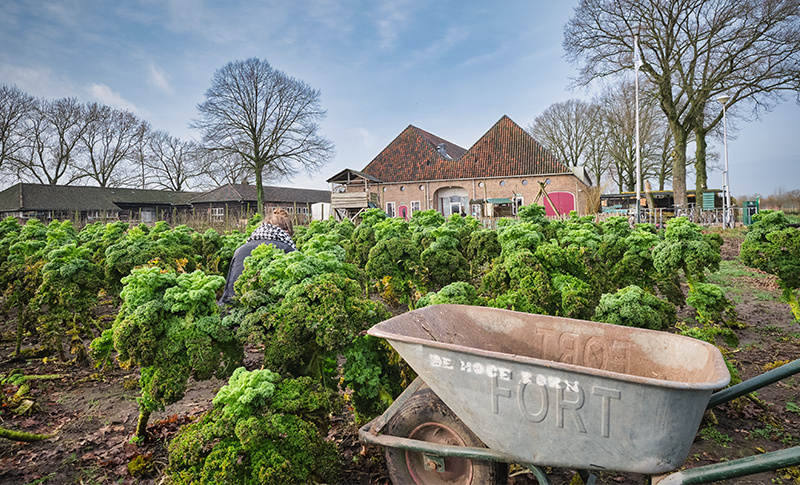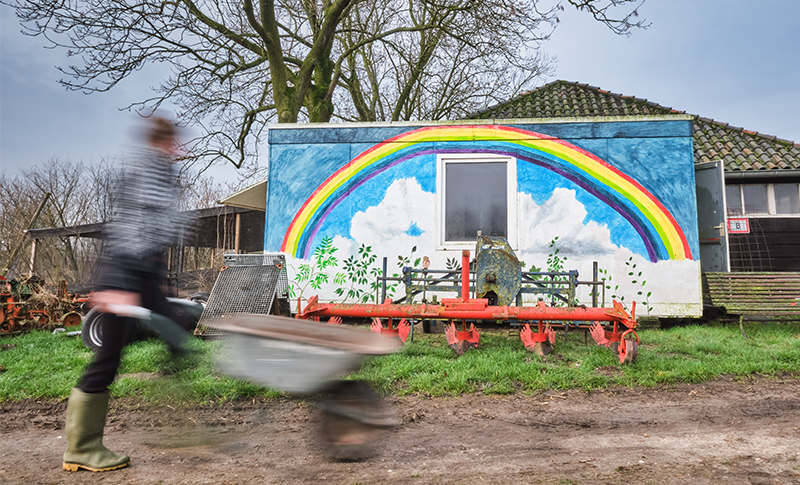The Dutch public broadcaster KRO-NCRV recently filmed the series Out of Office in which people suffering from a burnout spent six months working on a care farm. They found it a calming experience and appreciated the structure and space to work on themselves. No surprises there, says Marjolein Elings, a care farm researcher at WUR. ‘The care farming concept has so much more potential.’
Five dull thuds of iron on iron reverberate around the yard of De Hoge Born care farm. Finally, a dry day with not a cloud in the sky. It is ten thirty and time for coffee. Everyone stops work promptly and walks over to the canteen.
Marjolein Elings, who researches care farming, regularly visits De Hoge Born care farm, which is located on the Bornsesteeg just past the Unifarm fields. It is busy when we meet up with her there. ‘Originally, this was the university’s experimental farm,’ she explains. ‘WUR used to do field trials with potatoes. When the university no longer needed the land, various groups joined forces with the idea of setting up a care farm.’ People working on the farm who pass by all give Elings a friendly greeting.‘For some participants, their work here gives them a reason to get out of bed in the morning,’ says the researcher.
WUR has been researching the health effects of working on a care farm for over 20 years. ‘The sector has grown a lot in that time, from 75 care farms in the Netherlands in 1998 to more than 1350 today,’ says Elings. ‘People often associate care farms with overprotective day care for people with intellectual disabilities. But it hasn’t been like that for a long time. The groups working on care farms include elderly people with dementia, youngsters with behavioural problems, adolescents who have dropped out of school and people recovering from a burnout, as in that TV series. And they can all benefit a lot from the experience, as we have shown in various studies.’
Youngsters with behavioural problems are less likely to get in trouble with the police
Marjolein Elings, care farming researcher
The Netherlands is a trendsetter in care farming. ‘As researchers, we work closely with the Agriculture and Care Federation, an association representing some 900 Dutch care farms. The Federation tells us what questions the sector has and then informs its members of our research results.’ The way farms have been embedded in the Dutch healthcare system is attracting interest abroad too. ‘We are regularly invited to give talks or workshops for politicians and policymakers in other countries.’
School dropouts
Elings has been studying the effect of care farms on their participants — including at De Hoge Born — since 2002. ‘This isn’t a case of studying clearly defined interventions because participants differ in the work they do and how much time they spend on the farm. Also, participants have a life outside their work on the farm, which can affect their wellbeing too. That can make it difficult to quantify the effectiveness of this form of care.’
‘However, our research shows that participants are revitalized by a spell on a care farm,’ continues Elings. ‘For example, elderly people with dementia consume more food than they do when in regular day care. And youngsters with behavioural problems have more self-confidence after a care farm programme and are less likely to get into trouble with the police.’
We regularly give talks to foreign politicians and policymakers
Marjolein Elings, care farming researcher
One of her colleagues recently published a report on the use of educational care farms for children who have dropped out of school. ‘These children feel safe and noticed on a care farm, which has a calming effect on them. Many of the children who go through this programme are then able to return to the regular education system.’
The main focus in Elings’ own research is people with psychiatric or addiction problems. She uses questionnaires, in-depth interviews and focus group discussions to explore the mental health and social functioning of the participants. ‘Participants say the work on the farm makes them feel fitter because they are physically active. They develop self-confidence, self-respect and a sense of responsibility, and they feel useful. We also find people who are working at a care farm get better at looking after themselves, for example because they learn how to cook. What is more, we see a reduction in their use of medication and the number of contacts with care providers. People feel less stressed and are calmer. These are positive results.’
One of the participants studied by Elings is Marcel (56). He first attended De Hoge Born seven years ago. He was forced to move house due to circumstances and ended up in Wageningen. ‘I am susceptible to psychoses and there have been a couple of occasions where I got completely out of control. What people like me need is a calm environment and structure. And we get that here. I used to be a participant and now I’m a volunteer. This place helps me stay stable mentally. We pay attention to what we eat and drink, we have a structured day and a supportive social group.’

Flying off
Marcel shows us a colourful painting on the building next to the chicken shed. ‘This is where the eggs are cleaned and stamped. The building was looking a bit dilapidated from the outside, so I was allowed to paint it,’ he says proudly. Now one wall has a cheerful rainbow arching over a collection of trees and bushes. He also painted a small owl. ‘That is the unofficial De Hoge Born mascot. Every year, owls build a nest in the farmyard. We see the owlets grow big and then fly off.’ The owls are a fitting metaphor for the participants who attend the care farm.
Marcel’s story is similar to that of a lot of care farm participants, says Elings. ‘Their self-confidence gets a boost because they get positive experiences in caring for animals or growing crops. And the fact that participants are expected to turn up to the farm also helps their self-respect and makes them feel part of a wider community. You see them grow in their social skills.’
Mental health problems
The work on the care farm has a positive effect not only on the participants but also on the volunteers working on the farm. Elings: ‘We are currently seeing an increase in mental health problems, a sense of loneliness and a lack of connection and meaning in life. We recently held interviews with care farm volunteers and asked them what the farm meant to them. Their replies showed the farm environment also helped them to feel accepted, as somewhere they could be themselves.’
Elings sees that as the real strength of care farming. ‘Working with plants and animals feels particularly worthwhile. It is different to ordinary volunteer work or traditional forms of day care. One participant said recently, “I have all these worries going through my mind but then I work on the farm and I see everything just carries on — the birds build their nests, along comes spring, summer, autumn and winter, and nature just does its own thing.” People feel part of a bigger picture here, where they can do their bit. That has a huge positive effect.’
Working with plants and animals feels more worthwhile
Marjolein Elings, care farming researcher
Elings believes the potential is even greater. ‘Care farms could help improve the food supply chain, not just in the sense of bringing the food closer to the consumer, but also by bringing the consumer closer to the food. Most consumers don’t know enough about what goes on in farming. Care farms bring volunteers, relatives and other people to the farm and can therefore help bridge the gap between agriculture and society at large. That can be in both directions: consumers get a better picture of farming and farmers are better informed about consumer concerns.’
Creating something
Marcel is certainly committed to staying on at De Hoge Born. ‘I like working with the soil and plants,’ he says. ‘Something happens when you sow seeds, though you still have to give the process some attention. The soil seems dead in winter, but when you sow you discover how much the earth is capable of.’
‘People curious to know more about De Hoge Born are always welcome,’ says Marcel. ‘There is a sign saying “farm shop” next to the bridge over the Forum pond that points to us. You can shop here, have a cup of coffee on the patio or chat to the people working on the farm.’

 Schildering van vrijwilliger en voormalig deelnemer Marcel op de keet naast de kippenschuur. Foto Guy Ackermans
Schildering van vrijwilliger en voormalig deelnemer Marcel op de keet naast de kippenschuur. Foto Guy Ackermans 

